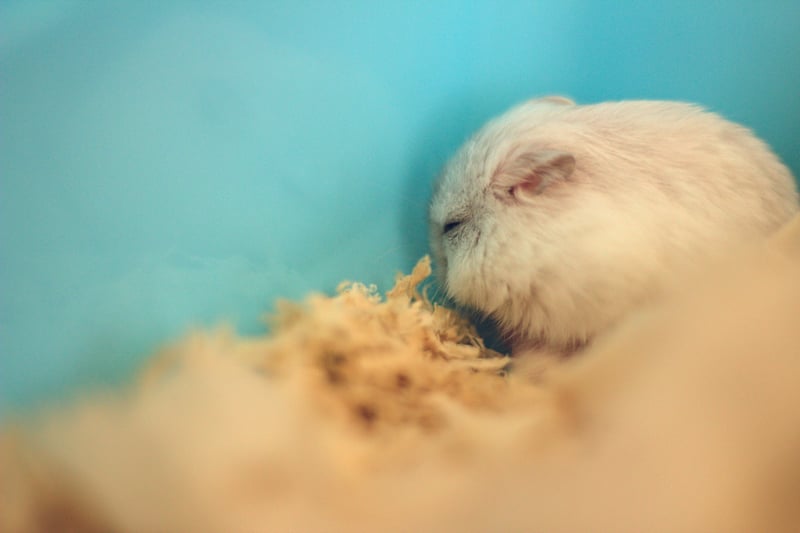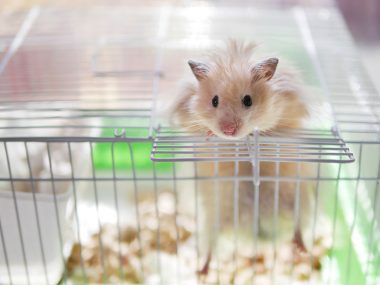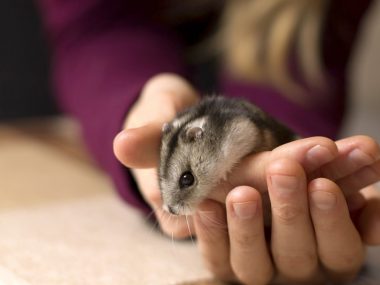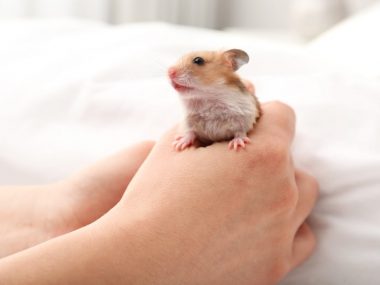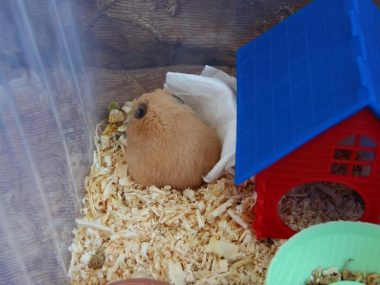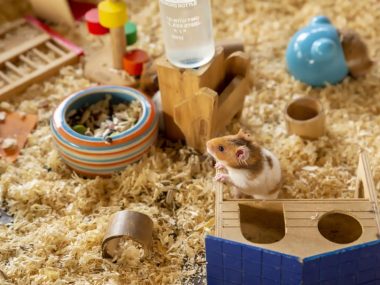Discovering your normally active hamster unresponsive can be very frightening. A million questions immediately start running through your mind. Is it sick? Is it dying? Has it been poisoned? Is it hurt? What can I do to help it? While a motionless hamster is never a good thing, there are some possible reasons that can account for a sudden decrease in activity.
Hamsters may show a marked decrease in movement as a result of any of the following reasons:
- Cold
- Heatstroke
- Hibernation
- Decreased activity caused by old age
- Pain or illness
- Anxiety or Fear
- Boredom or lack of space
- Death
While figuring out why your hamster is not moving may require a bit of detective work, the main short-term objective should be to make the little animal as comfortable as possible to ensure the best possible outcome. Let’s go through why your hamster may not be moving and how you can help.
Table of Contents
1. Your Hamster May Be Too Cold
Hamsters are incredibly temperature sensitive. When the temperature falls below 65F, it is too cold, and they are likely to slow down to conserve energy. You may even notice your hamster shivering.
A hamster that is well fed and kept as a pet should never hibernate, so any sudden lack of movement resulting from cold needs to be addressed and corrected. Find out more about how to keep your hamster warm.
2. The Hamster May Have Heatstroke
Overheating is by far one of the most dangerous conditions for a hamster. A hamster with heat stroke will often lie motionless, its body limp, like it’s asleep.
Heatstroke is often fatal. If the temperature is above 80F and your hamster is not moving, immediately move the cage into a cool area. Offer some slices of cool fruit like a slice of cucumber and place a chilled ceramic plate into the cage to cool things down.
Solid side cages are particularly dangerous for hamsters in terms of possible overheating because they don’t allow adequate ventilation. Be particularly aware that your hammie’s cage is never placed in direct sunlight.
3. The Hamster Could Be Hibernating
Contrary to popular belief, hamsters don’t enter a true hibernation state like bears or squirrels. Their bodies may shut down in response to cold, darkness, or lack of food. This is not a desirable situation for a pet hamster and one that owners should avoid.
If you suddenly find your hamster unresponsive, especially if it has been cold or the room where it is kept has been darker than usual, it will need attention. Torpor is the correct term for a hamster’s temporary shut down, and it doesn’t have enough energy stored to remain in that state for very long.
The hamster needs to be gently warmed up and provided with plenty of high-energy food to make a full recovery.
4. Old Age May Be Slowing Your Hamster Down
Sadly, hamsters don’t have a very long life span. We wish they did, but time marches on, and before we know it, our baby hammie may be already in its golden years. An elderly hamster may naturally become less active in the last part of its life.
Older hamsters can be kept active longer by ensuring that they are kept warm and well-nourished. Read our article about hamster life expectancy.
5. Pain or Illness May Be Making Your Hamster Move Less
A lack of activity in hamsters may be associated with an underlying condition or pain. If your little hammie seems reluctant to move and stays huddled in one area, it is essential to consult a veterinarian.
Pain medications are available for conditions like arthritis associated with old age, so help your pal get relief so it can enjoy life for as long as possible.
6. Anxiety or Fear Can Make A Hamster Freeze
The term ‘scared stiff’ is something that definitely affects hamsters. Remember that these pets are related to wild hamsters, which are prey animals. So if your curious family cat has popped over to say hello, or there is a scary fan or loud machine close to your hamster’s cage, the small animal may freeze up from fear.
Hamsters have poor eyesight and rely on hearing and smell to navigate the world. When they are scared, they often freeze in position, but when you reach out to investigate, they may respond aggressively to try to defend themselves. Ensure that your hammie has plenty of places to hide from things that may frighten it.
7. Boredom or Lack of Space Will Affect Hamster Activity
A bored hamster may become lethargic and appear sleepy. There is little point to getting up and running around if there is nothing interesting to do. Hamsters are intelligent little creatures, so to keep your hammie busy and active, provide it with enough space to run about doing important hamster things, as well as plenty of interesting toys.
Studies have found that hamsters with toys in their environment are generally much healthier and happier than those without. Hamster cages are frequently also too small to provide a stimulating environment. Click here to see if your hamster cage is large enough for your pet.
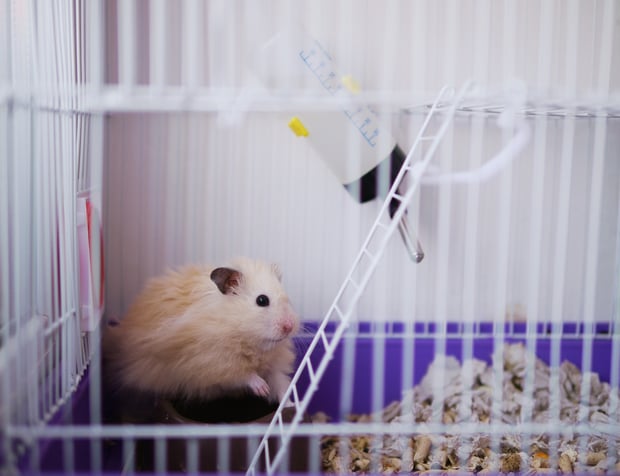
8. The Hamster Might Have Died
Hamsters are adorable and lovable pets, but they are fragile little animals, and sometimes you may not even realize they are sick before it’s too late. Never assume that your hamster has died if you see it’s not moving.
If your hamster is completely still and stiff and its eyes are open, it has probably passed away. If its eyes are closed, even if it feels cool, it may simply have slipped into a period of temporary hibernation as a result of something stressful like cold, prolonged darkness, or insufficient food.
If it’s hibernating, its breathing will have slowed down, so you may not be able to detect it. Place the animal in a warm area and consult a veterinarian if you are unsure if your hammie is in a state of torpor or has died. It can sometimes be tricky to tell for sure.
Frequently Asked Questions
How Do You Know If A Hamster Is Dying?
There is no definite way to tell if your hamster is dying, but there are plenty of signs to know if it is sick or nearing the end of its lifespan as a result of old age. If you see your hamster is ill, don’t write it off immediately and assume it will die. A veterinarian can successfully treat many conditions, especially if you catch them in the early stages.
Any changes in behavior, grooming, activity level or onset of diarrhea must be investigated. Stress is also a major cause of death in hamsters, so don’t discount psychological and environmental factors when taking care of your hamster’s health.
Is My Hamster Dead Or Hibernating?
It can be difficult to tell if your hamster has died or is in a state of temporary hibernation due to an environmental factor like cold or darkness. The first step in assessing an unresponsive hamster is to ensure that the environment is at least 65F. Anything lower is simply too cold for these little animals.
Another clue is to check if your hamster’s eyes are open. A hamster may die with its eyes open or closed, but if its eyes are open and an opaque glaze has formed on the surface, the little creature is probably dead. Don’t try to open your hammie’s eyes if they are closed.
Next, hold a reflective surface like a mirror or spoon directly against the hamster’s nose. If there is any sign of fog on the surface, the hamster is still breathing.
You can also gently stroke its fur and watch attentively for any twitching of its whiskers. A hibernating hamster may feel cool, so body temperature is not an accurate determination of death.
If you have warmed the room to more than 65F and after 24 hours, the hamster is still unresponsive, it has probably died.
Why Is My Hamster Just Sitting Still?
Hamsters become inactive for several reasons, including improper temperatures, pain, illness, fear, or boredom. Any sudden changes in its behavior or activity level must be promptly investigated.
However, remember that these little animals are nocturnal, so when you go to bed at night, your little pet may just be getting up for the day. If your hamster seems quiet during daylight hours, but you can hear it running actively on its wheel and exploring at night, and it is eating and drinking, as usual, it is probably just catching up on a bit of rest.
References:
https://www.sciencedaily.com/releases/2005/11/051125111256.htm
https://pethelpful.com/rodents/Causes-of-Sudden-Death-in-Hamsters
https://www.vets-now.com/2017/06/heat-stroke-in-rabbits-guinea-pigs-and-hamsters
